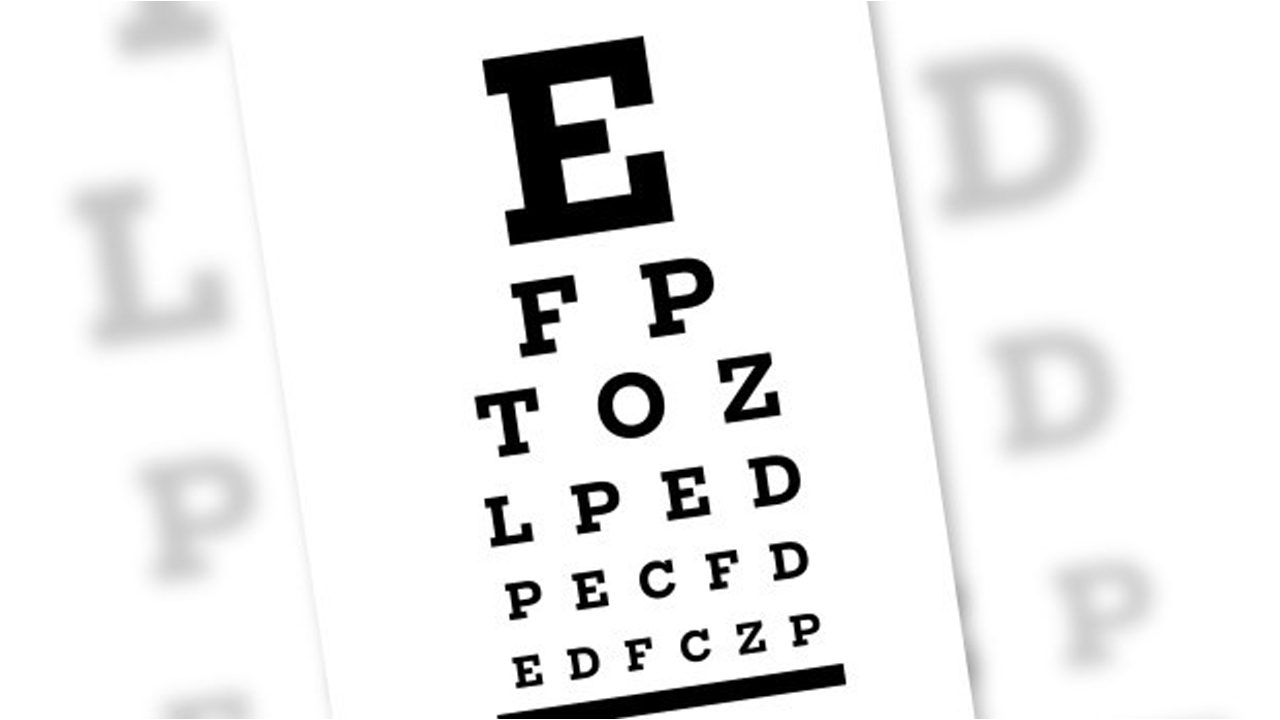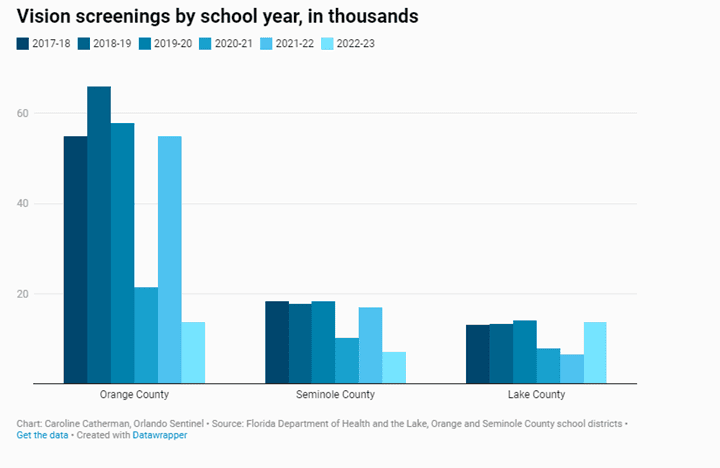
School health screenings plunge in Central Florida under parents’ rights law
Eyesight, hearing and growth tests can spot problems that lead to academic struggles, advocates say
Orlando Sentinel | By Leslie Postal | October 19, 2023
Florida’s public schools historically have checked thousands of students a year for vision, hearing and growth problems, hoping to catch early health issues that can impede academic achievement.
But the number of students in Orange and Seminole public schools screened last year plummeted after Florida passed a new law that requires parents to give written permission for their children to take part in school-based health screenings, data from the state and the school districts show.
Orange County Public Schools, for example, screened nearly 55,000 students for vision problems during the 2021-22 school year but fewer than 14,000 students during the 2022-23 school year, a drop of nearly 75%.
Seminole County Public Schools screened about 7,100 students for vision problems last school year down from nearly 18,000 the prior year.
Both districts checked fewer students for eyesight problems last school year than they did in the 2021-22 school year, when the COVID-19 pandemic had thousands of students doing online lessons from home, making them unavailable to take part in on-campus health screenings.
Florida’s Parental Rights in Education law — dubbed “don’t say gay” by critics because it limits instruction about sexual orientation or gender identity — was first adopted in 2021 and then expanded in 2022 and 2023.
It requires parents to provide written consent for medical procedures, including school health screenings and clinic treatments such as ice packs and bandages. It also means schools must request written parent permission for students to be called nicknames, attend school pep rallies or join after-school clubs.

Trying to head off trouble
Health experts and educators worry about the decline in screenings, noting that undiscovered health issues can lead to classroom struggles.
“The hearing and vision tests are important because difficulties with these senses are often subtle, and neither parents, teachers nor children may even recognize that a problem exists,” said Michael Weitermann, Seminole school district’s health services coordinator, in an email. “A child who has difficulty reading the blackboard may not know that she is seeing differently from anyone else.”
Children from low-income families are more likely to have undiagnosed vision problems, studies show, making screenings an important first step to getting them help and heading off academic problems.
In Orange, many students do not regularly see a pediatrician, said Dr. Robert Karch, director of the Florida Department of Health’s Orange County office, in March, after he and OCPS Superintendent Maria Vazquez made a public plea for parents to give permission for screenings.
“A lot of the children in OCPS, this is their vision screening,” Karch said of the school-based program.
Statewide data on health screenings from the 2022-23 school year is not yet available on the Florida Department of Health website, so it is not clear how widespread the problem seen in Orange and Seminole was.
In Lake County, the school district saw a dip in screenings starting in 2020, but last year it screened a typical number of students for its system.
“The law did change and made things very, very complicated for all of us,” said Kristine Landry, the district’s director of student services.
But her district boosted screening participation, she said, by having school nurses call some parents asking them to opt in and then sending health services permission slips home with their children.
Landry said school districts are required by law to do health screenings, with the goal of checking 95% of the students eligible. In the past, parents could opt their children out, but if they didn’t do that, those youngsters were screened.
The new law requires parents to provide written permission, whether done online or on paper, or their children will not be screened. “We have to honor what parents want,” she added.
670,000 have vision checked
Health screenings are done in kindergarten, first, third and sixth grades, though not all occur in every grade. The largest number of students are screened for vision problems, with nearly 670,000 Florida students checked for eyesight problems in the 2021-22 school year.
More than 75,000 of those students, or about 11%, had “ abnormal screening results,” according to the department of health’s 2021-22 screening report.
In February, Vazquez used her weekly video message to parents to explain the law change and urge them to approve the health screenings. Karch joined her.
“It really has been an adjustment. And you and I have both been concerned about the low numbers of families opting in,” Vazquez said.
But when the school year ended, OCPS had done fewer screenings than any year in the past decade.
This year, the school district is using paper permission slips as well as its online parent portal to encourage more parents to OK the screenings for their children, said Slyvia Schaffer, OCPS senior director of student health services, in an email.
Jae Williams, press secretary for the state’s department of health, said some families who did not opt into school screenings might already have gotten their children screened elsewhere.
“They don’t see a need for it, right, because their kid just went for their yearly physical in July so they can play sports,” he said.
Even if they are not screened, some Florida students can get free comprehensive eye exams and free eyeglasses through the Florida Heiken Children’s Vision Program.
The initiative, which works mostly in schools with large enrollments of children living in low-income families, served about 18,000 students last year, said spokesperson Cameron Ehren Sisser.
About 28,000 children were referred to the program, but not everyone could be served in Heiken’s mobile vision clinics due to funding limits, Sisser said.
Study finds improved academics
A decade ago university researchers from Minnesota found that vision screenings combined with free follow-up exams and free eyeglasses improved academic achievement in Central Florida students.
The study focused on schools in three local school districts with large populations of students from low-income families, finding that more than 25% failed initial vision screenings.
Fifth graders who failed screenings but got free eye exams and glasses did better on state standardized tests than similar students not provided that care, according to Paul Glewwe, an economics professor at the University of Minnesota who led the study.
Kristine West, an economics professor at the St. Catherine University in St. Paul, Minnesota, who also worked on the study, said it would worry her if Florida school districts saw continued declines in screenings, especially in schools with many children live in poverty and vision problems are more likely to be undetected.
Screening students doesn’t solve the problem, she said, but is a first step to “a potentially very cost effective intervention in education.”
A decline in screenings, however, is not surprising given the change in law, she said.
Many studies of human behavior show what works best, if you’re trying to increase participation. “Opt out is better than opt in,” West said.





